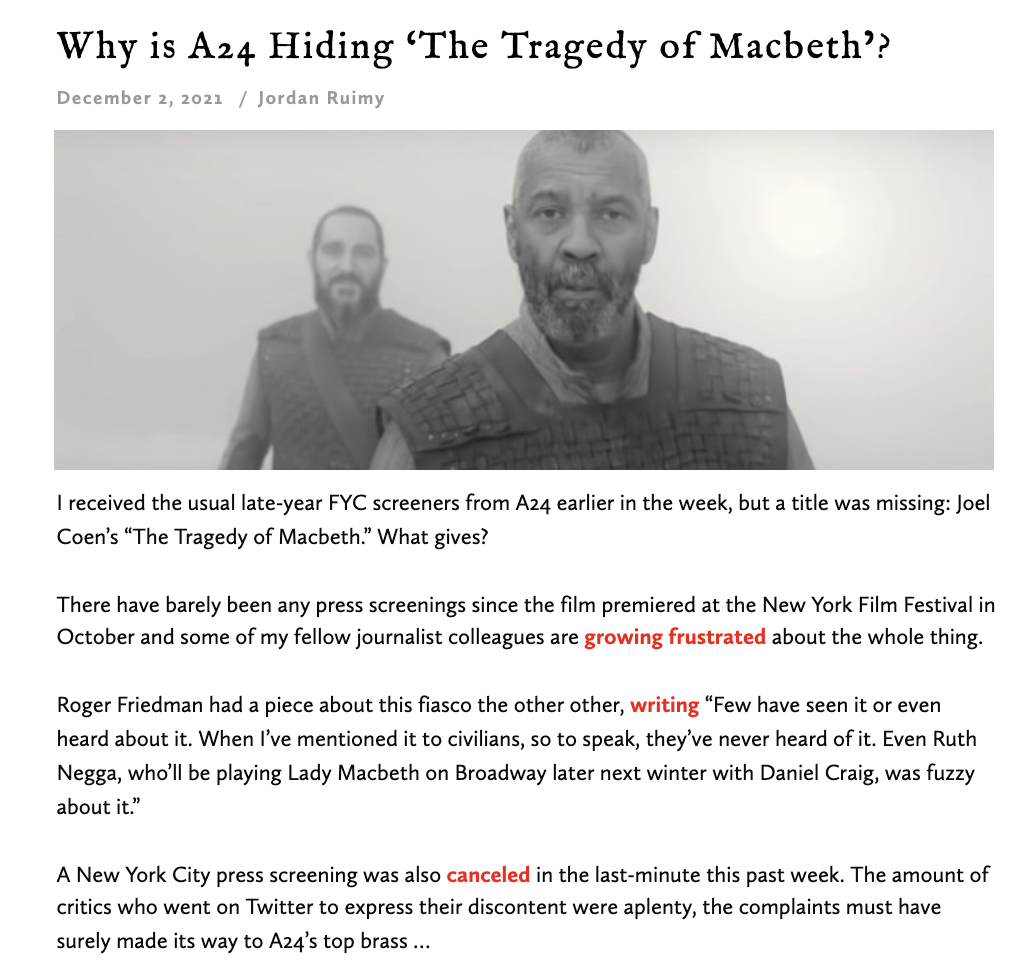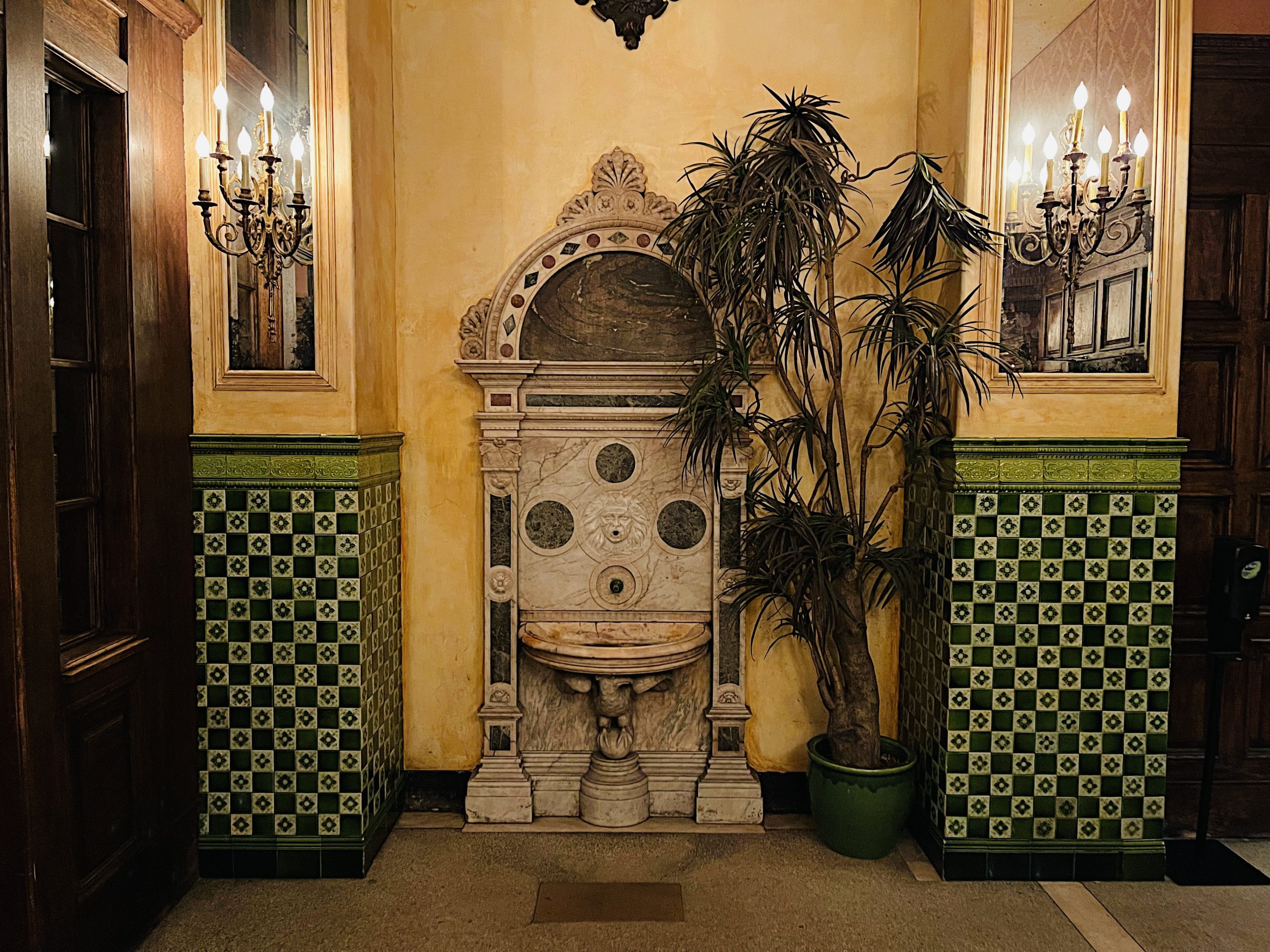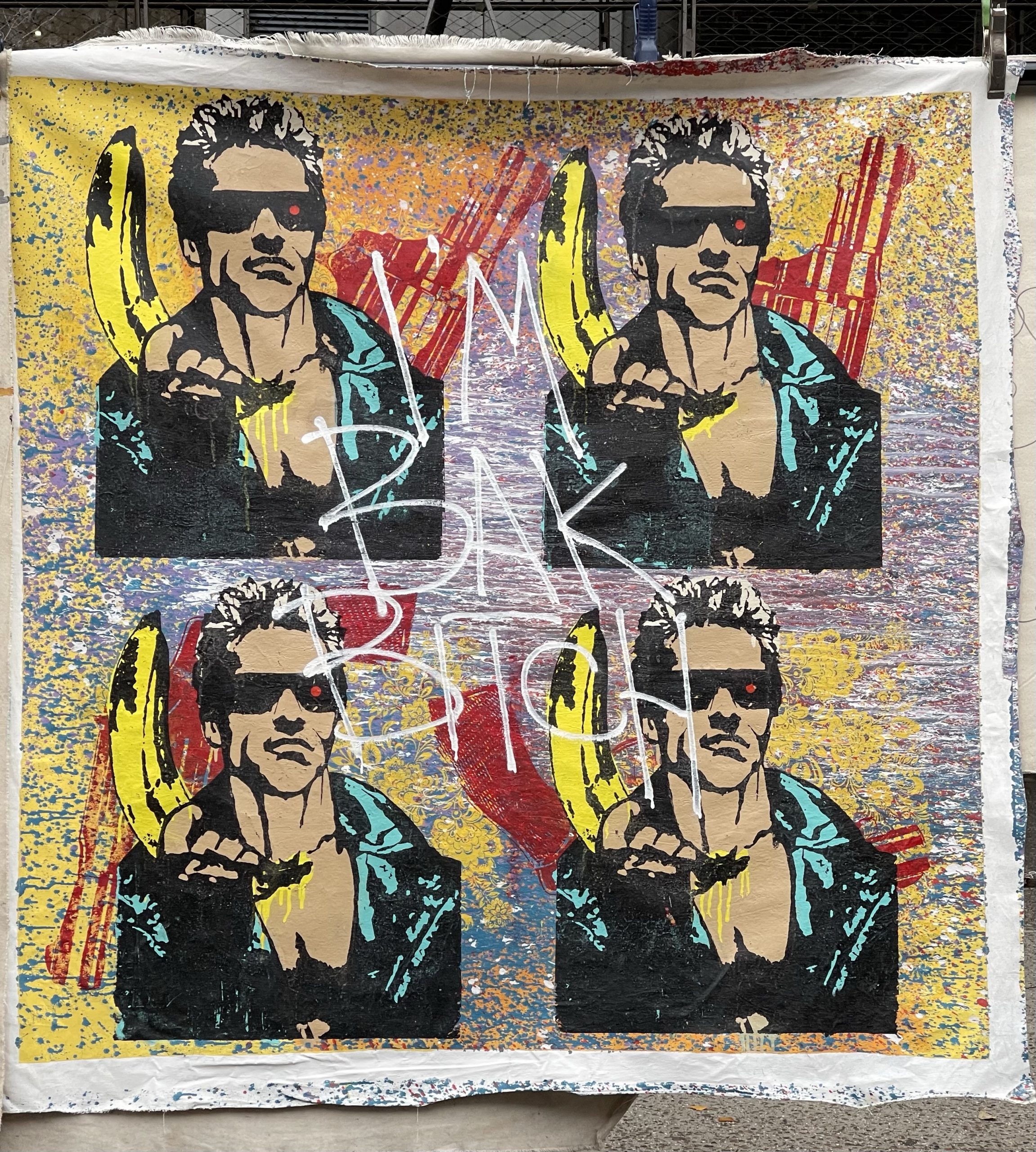When they voted to hand Lady Gaga their 2021 Best Actress award, the New York Film Critics Circle knew they were smirking, half-kidding, succumbing…they’re supposed to be the fickle hardcore weirdos who always vote political-progressive…the austere, top-of-the-line, above-the-fray guys. And when push came to shove, they tumbled for a performance that they knew was mainly a populist sop…push came to shove and a majority decided “shit, how cool would it be for Lady Gaga, a major tabloid glamour-puss, to attend our awards ceremony?” They know Penelope Cruz‘s performance in Parallel Mothers is way, way above Gaga’s, and they voted for Gaga anyway. Giving it to Jessica Chastain for The Eyes of Tammy Faye would have been a more honorable choice. Or Being The Ricardos‘ Nicole Kidman. Or Alana Haim even.
Hard to Focus
…with two beggars staring holes at you. Give us a piece of your croissant, please. or half a spoonful of that chicken salad you bought last night. Feel our longing…please.

Kodi Smit-McPhee Was Good But…
11:55 am: As we speak the New York Film Critics Circle has decided upon four awards: The Power of the Dog‘s Kodi Smit-McPhee for Best Supporting Actor (I don’t get it), The Tragedy of Macbeth‘s Kathryn Hunter for Best Supporting Actress (haven’t seen it), Joachim Trier‘s The Worst Person in the World for Best Foreign-Language Film (excellent choice!) and Flee for Best Non-Fiction film.
No updates until the mid-afternoon — Variety‘s Clayton Davis is keeping tabs.

Good Vibrations
11:30 am: Hollywood Elsewhere will finally shake hands with Sutton Wells early this afternoon. I’ll be leaving Manhattan within the hour, taking the Holland Tunnel to New Jersey and over to West Orange. Staying the weekend, etc.
Ebenezer Scrooge to daughter-in-law: “Can you forgive a pig-headed old fool for having no eyes to see with nor ears to hear with all these years?”
John Huston‘s Noah Cross to Belinda Palmer‘s Katherine Mulwray in Chinatown: “Katherine, I’m…I’m…I’m your grandfather.”
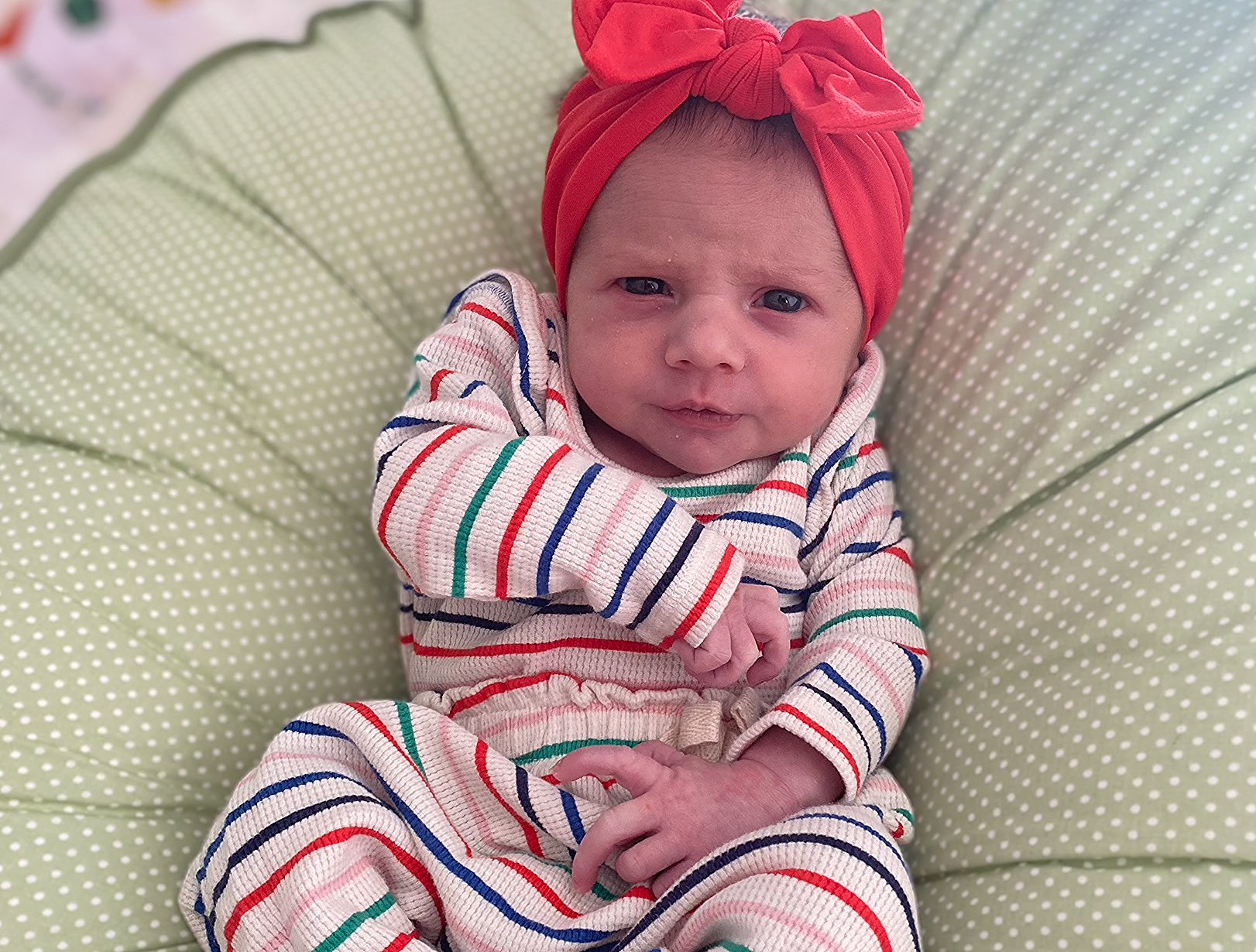


Son of “Came The Dawn”
[Originally posted on 10.5.08] Sometimes car accidents can be…well, not too bad. Sometimes they can be shrugged off with no cops, no insurance, no injuries, no nothin’. I learned this when I was 18 or 19, and I’ve never forgotten the lesson. Not everything that goes badly needs to be catastrophic.
Four of us had done an all-nighter in Manhattan, wandering around the streets on mescaline, the usual West Village-East Village walk-around, not much cash, soaking up the energy.
We drove back to Connecticut around 5 am, the light starting to break. And somewhere around Rye, or right before the Connecticut border, we came around a curve and there was this beige Volkswagen Beetle lying on its side, the owner standing nearby, looking more or less unruffled and going “hmmm.”
We immediately pulled over, put on the flashers, got out and ran over and helped the guy right it. One, two, three…done. Quick thanks, hand shakes all around. The bug (which had scratches but no serious scrapes or dents) started right up and he took off. We did the same. It was semi-dangerous standing near a curve, of course, but one of us stood 75 feet south to wave off traffic. The whole deal took maybe 90 seconds…okay, two minutes.
My friends and I barely spoke of the episode later, that morning or the next day or over the weeks and months that followed. It happened and that was that.
What Does “Young Sinner” Mean?
The title of Paul Verhoeven‘s upcoming Washington, D.C.-based thriller implies that most sinners aren’t “young” — they tend to come into their best sinning in their mid 30s, 40s and 50s. The title also reminds me of The Young and the Restless. It also reminds me of Young Frankenstein.
From World of Reel‘s Jordan Ruimy…
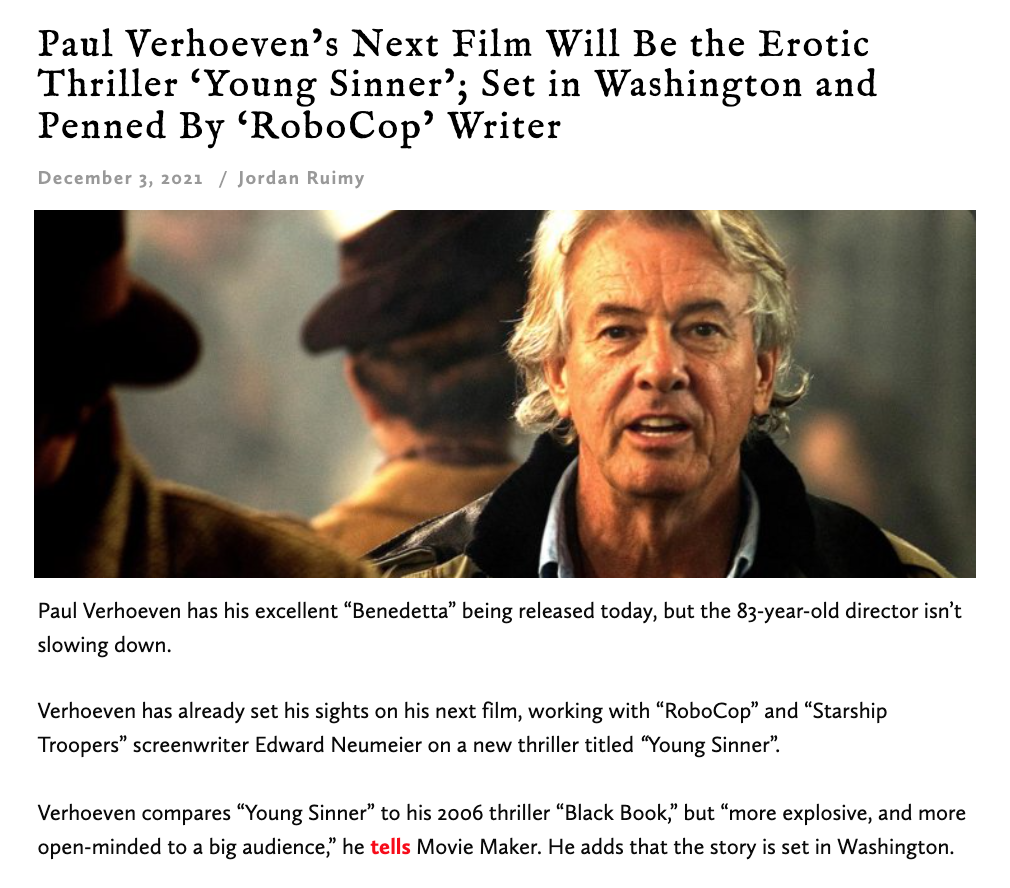
Bradley Downer Fulfills His Fate
HE’s #1 mantra: If a movie ends well, that’s half the ballgame. Let no one ever argue that Guillermo del Toro‘s Nightmare Alley (Searchlight, 12.17) doesn’t end well. It ends perfectly, in fact. It reiterates the basic film noir theme, which boils down to the main character fatalistically admitting that he’s doomed, and in fact has been doomed all along. He never had a chance, and his dark fate is so irrefutable that it’s funny.
Film noir basically says that none of us have a chance. Which we don’t if your definition of having a chance means escaping death. We’re all going to die. But if I had accepted this fatalistic, fuck-me doctrine when I was in my teens or 20s my life wouldn’t have worked out. So noirs are basically films with a bad attitude. They all say that noir protagonists are fucked and can’t “win” because they’re essentially self-destructive by way of some basic flaw or weakness, and that most of our dreams and schemes will never pan out.
Let no one say that Nightmare Alley hasn’t been masterfully composed — it’s all visually harmonized (the dp is Dan Laustsen) and exquisitely designed. Half of it radiates a rural travelling carnival vibe, the other half a snow-blanketed, pre-war urban (deco-moderne) gloom. And yet all of a piece…persistent and narcotizing and finally overwhelming.
HE to friend outside multiplex: “Yo…what are you seeing?”
Friend to HE: “Nightmare Alley. I’m a Guillermo fan, and I don’t care if it has no monsters.”
HE to friend: “I just saw it.”
Friend to HE: “And…?”
HE to friend: “Great cinematography and production design, lotsa gloom, good performances.”
Friend to HE: “But how is it?”
HE to friend: “You’re on your own, man. I’ll tell you this much — Bradley Cooper smokes 50 or 60 unfiltered cigarettes. Every damn scene he lights up, and it’s infuriating.”
When and if you watch Nightmare Alley (and I am recommending that you do) you need to accept from the get-go that Cooper’s Stan Carlisle is fucked — an asshole and a cruel hustler who’s determined to downswirl and self-destruct, and that how he manages to ruin his life as well as kill or maim those around him is just a matter of time, circumstance and opportunity.
But the ending, man…that ending is exquisite.
Rousseau for Idiots
Four kids get their groove on under the influence of Henri Rousseau. Except it’s not Rousseau’s brushstrokes as much as the jungle boogie percussion score. Basic idea: “Great post-impressionist art is a trip if…you know, you can also hear drums that make you want to dance.”
Imagine being the moron (Mark Zuckerberg?) who insisted that Rousseau’s bengal tiger had to channel Rod Serling by saying “this is the dimension of imagination.”
Why? Because the average young kid who might be into Zuckerberg’s Meta (which is what the spot is hyping) is presumably incapable of understanding that falling into the world of a painting starts from a place of silence, submission and meditation.
In other words, somebody actually said “the tiger has to say the word ‘imagination’ or else some younger viewers might think we’re talking about an immersive Rousseau installation somewhere, like the Van Gogh thing making the rounds.”
Jettison Harris in ‘24
Issues-wise I’m closer to Vice-President Kamala Harris than any potential Republican opponent, of course, but I’m scared to death of her running with 81 year–old Joe Biden in ‘24. Because her approval numbers are quite low, and she seemingly has nowhere to go but down. She won’t enhance the ticket — that’s a given. In ‘20 she proved ineffective as a campaigner (whiny speaking voice, testy attitude now and then, dropped out before Iowa). She has to somehow go away — seriously.
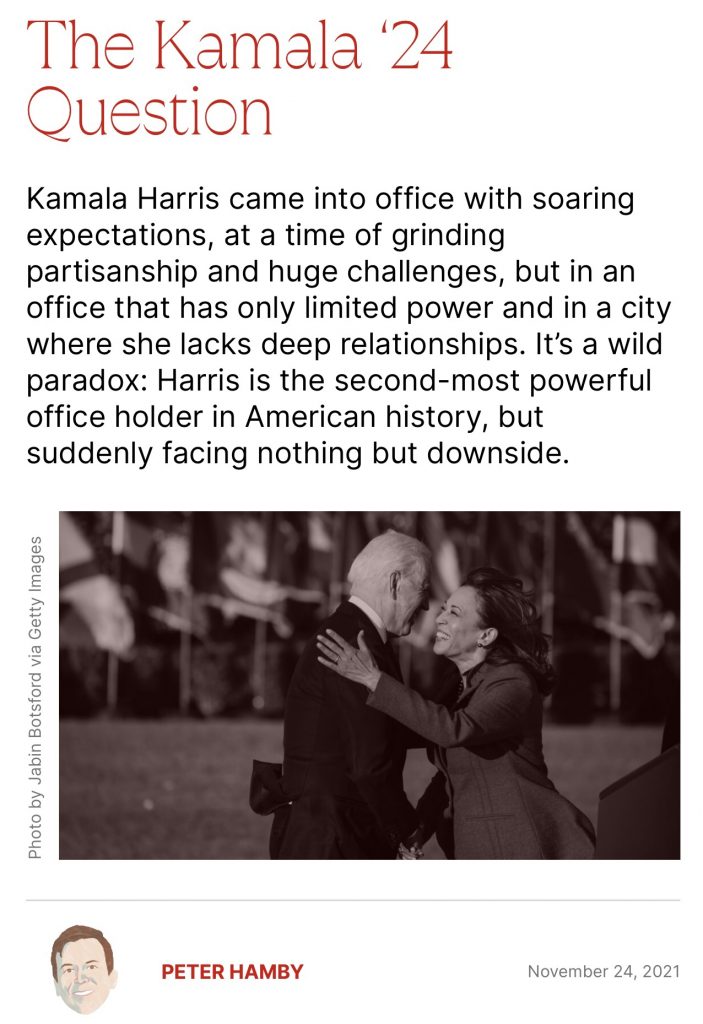
“Citizen Pizza” Takes Top 2 NBR Trophies
I’m telling you right now that Paul Thomas Anderson’s Citizen Pizza is (a) HE-approved as far as it goes, (b) a well-crafted, moderately engaging ‘70s episodic with a really good ending, and (c) a highly eccentric choice for a 2021 Best Picture award.
Am I enraged that the National Board of Review picked it earlier today, and that they gave their Best Director award to PTA? Of course not — it’s fine, not a problem at all. But this was a very New York Film Critics Circle thing to do, guys. You can choose whatever and whomever you wish, but the Movie Godz are watching, and they know what you did.
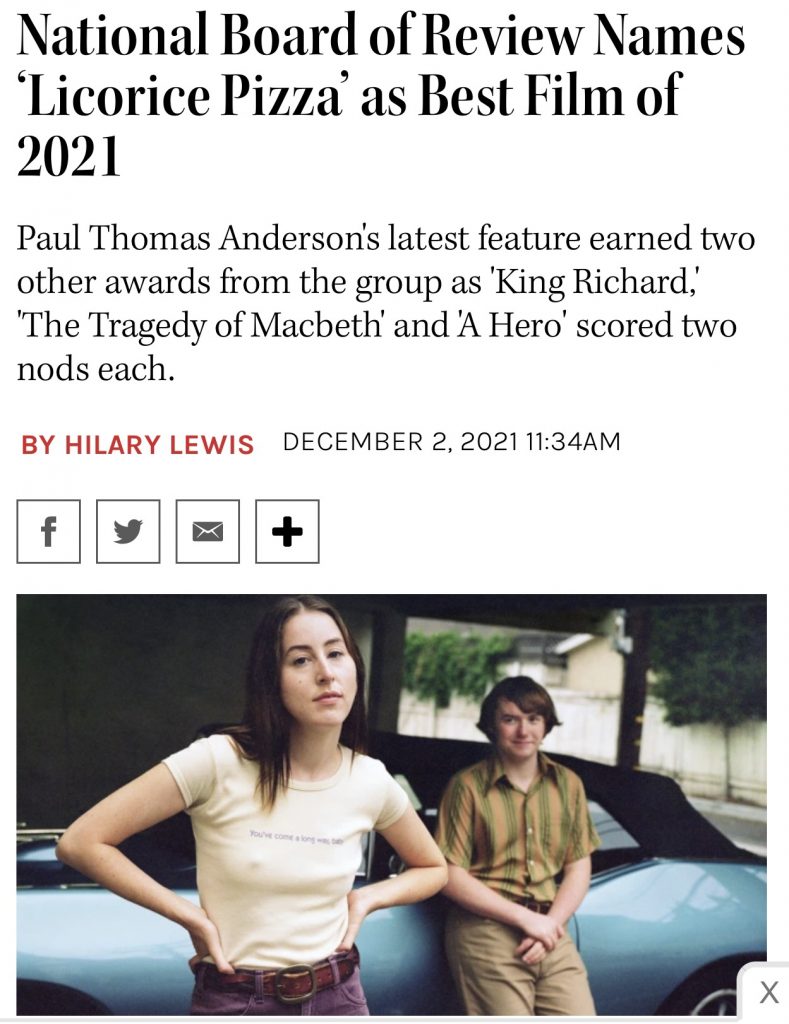
Hide The Ball
World of Reel‘s Jordan Ruimy is persuaded that A24 is putting out vague, inconclusive signals about Joel Coen‘s The Tragedy of Macbeth:
